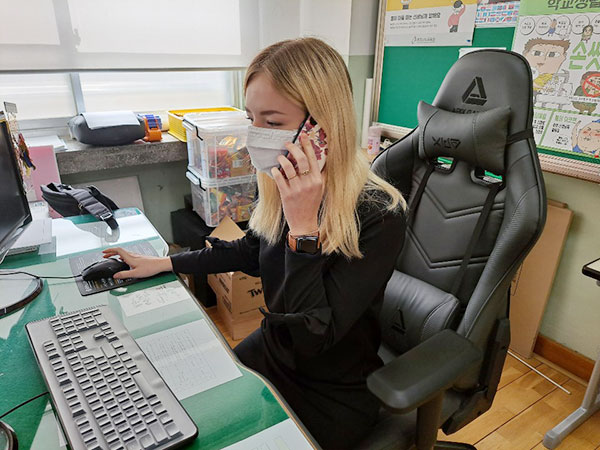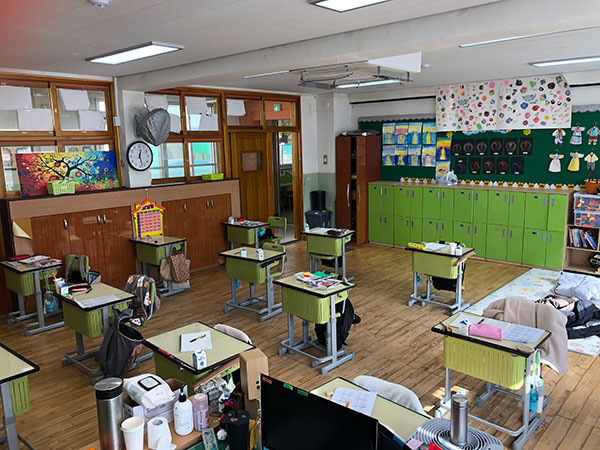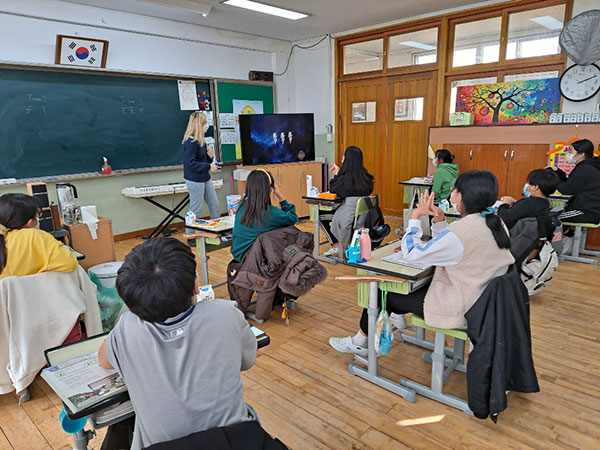
-
Effective Teaching in the COVID-19 Situation: The Power of Distance
Victoria Hepler
When I made the leap of faith to move across the world and take part in the Teach and Learn in Korea program (TaLK), I believed I had a good idea of what was to come in the next year. Little did I know that what I was about to undertake was not at all what I had expected. I moved to South Korea in the winter of 2019 and was lucky enough to be placed in a town called Buyeo-gun in the Chungcheongnam-do Province. I work at a small elementary school with 26 students called Songgan-Cho Elementary. The first six months were a dream. We were mask free, hugging, holding hands, and enjoying being in each other's presence. I was able to bond with my students and create a relationship with them, regardless of the language barrier that we faced. I was beginning to feel comfortable within South Korea and confident in my skills as an English Teacher to my students. My first semester ended with my kiddos and I was excited to begin the second half of my one-year contract. February rolled around and everything changed. The COVID-19 virus hit South Korea and impacted the rest of my teaching experience here in South Korea. School was put into a halt and the entire school environment took a drastic turn. Everything that I once knew as a teacher and the style of teaching I had learned to use was now going to change. As months passed, we learned, we adapted, and we evolved to the current world situation. The new rules and regulations pushed us to find a new “normal” within the school environment. This was effectively executed through dedication and hard work from both the teachers/staff and the students of my school.

As the COVID-19 pandemic became a forefront of all news headlines and people’s minds, it also affected my school in a number of ways. The spring semester of school was pushed back almost 2 months. The first two weeks of school were primarily online. My job was to help Korean students practice speaking English and the online schooling forced us to brainstorm and think of ways that we could still accomplish this. Through cooperation with the Korean English teachers, the student’s parents, and myself, we were able to generate a plan through phone calls to somehow continue the process of learning English. The plan involved scheduling to make phone calls with the students once a week for 3rd and 4th grade and two times a week for 6th grade. This was executed through specific time periods of 15-20 increments with each student to converse with myself and the Korean English teacher if translation issues were to occur. Through this home phone call practice we were able to cover the first lesson for grades 3, 4, and 6 within those first two weeks of the spring semester. While it was not as educational as face-to-face teaching, it was a good way to adapt to the current external environment and still provide education in some form. Please refer to picture 1 for example of phone call practice conversations.

After the two weeks of online schooling had passed, we were gratefully able to open school again with some rules and regulations. We were enforced to wear masks constantly and practice social distancing. The days of hugs and high fives were now over and it was crucial that we find other ways to adapt. The main way we needed to change was regarding space between one another. Desks were required to be apart and students were only allowed to leave their home classrooms for lunch and to use the bathroom. Please refer to Image 2 for the layout of desks. The reason this was such an issue was because most games and activities required us to move around and engage with one another. This massive change required us to research new ways to make the classroom fun and English learning enjoyable while following the rules that were currently being enforced. In collaboration with my students, Korean English teachers, and myself we were able to go through the process of trial and error and find activities that worked well for us, despite the challenges. These games consisted of many writing games that could be done individually such as the Telepathy game, which engaged their competitive sides all while staying distanced with one another. We were also able to do team speaking games all while remaining seated and still learn English through a fun, positive environment. Please refer to Image 3 with a real-life example of teaching within social distancing.

Within my classroom, I enjoyed giving positive encouragement through high-fives, hugs, and pats on the back. Because of the need for social distancing, this was no longer allowed. I wanted to find a way to give back to my students for their hard work and dedication in such a difficult time as a student. Through research I was able to find an online point system for students primarily designed for social distancing called Class Dojo. I was able to use the online system to provide points to each student with rewards assigned to point totals individually and as a class. The link for Class Dojo: https://www.classdojo.com/. In the end, this system actually was more enjoyable for my students than some of my previous reward systems, so I am grateful that even though the situation was not ideal, a positive outcome was able to come from it.
Another area that was required to change was enforcing masks. When learning a language, looking at your teacher’s mouth and how they use their face when speaking is vital. This was taken away from wearing a mask. I understood as a language learner myself for Korean, I needed to find a way to adapt to these new rules because the students needed this portion of language learning in order to be successful. I spoke with other TaLK scholars and EPIK teachers to get their input and I came to the conclusion I needed to find a way to have my students physically see me speaking without removing my mask during class. In the end, I decided I could execute this by recording multiple videos of myself outside of the classroom speaking the necessary vocabulary and expressions for the lesson at hand and display these videos at the beginning of class when reviewing and practicing. I realized that it was the perfect scenario to help my students see me speaking and practice with those videos all without removing our masks. This was a main aspect of change that I found to be very effective within the classroom.
While this was not the experience I had initially signed up for, I believe that through the current environment I have been able to connect with my students in a personal way that I would not have been able to before. We needed to work together and find ways that we could excel through these challenges and still enjoy the process. My number one goal was always for my students to learn English in the most enjoyable way possible, regardless of social distancing or not. The new rules and regulations helped me as an individual and as an English teacher learn the importance of being able to adapt to the current situations I face and find the best possible solution. I am lucky enough to have a small school that can continue to have class as cases rise and fall in South Korea. My students have been the greatest throughout this entire situation because no matter how difficult it has got or how discouraged I may have gotten, they pushed through and encouraged me and each other. They understood this was new for me and I knew this was new for them. Because of this we were able to work together and continue the language learning process in a positive, happy environment. While this process was not ideal, focusing on my students' needs has helped me evolve and work past the challenges for the sake of them.
English Program in Korea(EPIK), Teach and Learn in Korea(TaLK)
National Institute for International Education Ministry of Education, Republic of Korea
191, Jeongjail-ro, Bundang-gu, Seongnam-si, Gyeonggi-do, Republic of Korea (zip code) 13557 Tel : +82-2-3668-1400 Fax: +82-2-764-1328
National Institute for International Education Ministry of Education, Republic of Korea
191, Jeongjail-ro, Bundang-gu, Seongnam-si, Gyeonggi-do, Republic of Korea (zip code) 13557 Tel : +82-2-3668-1400 Fax: +82-2-764-1328


